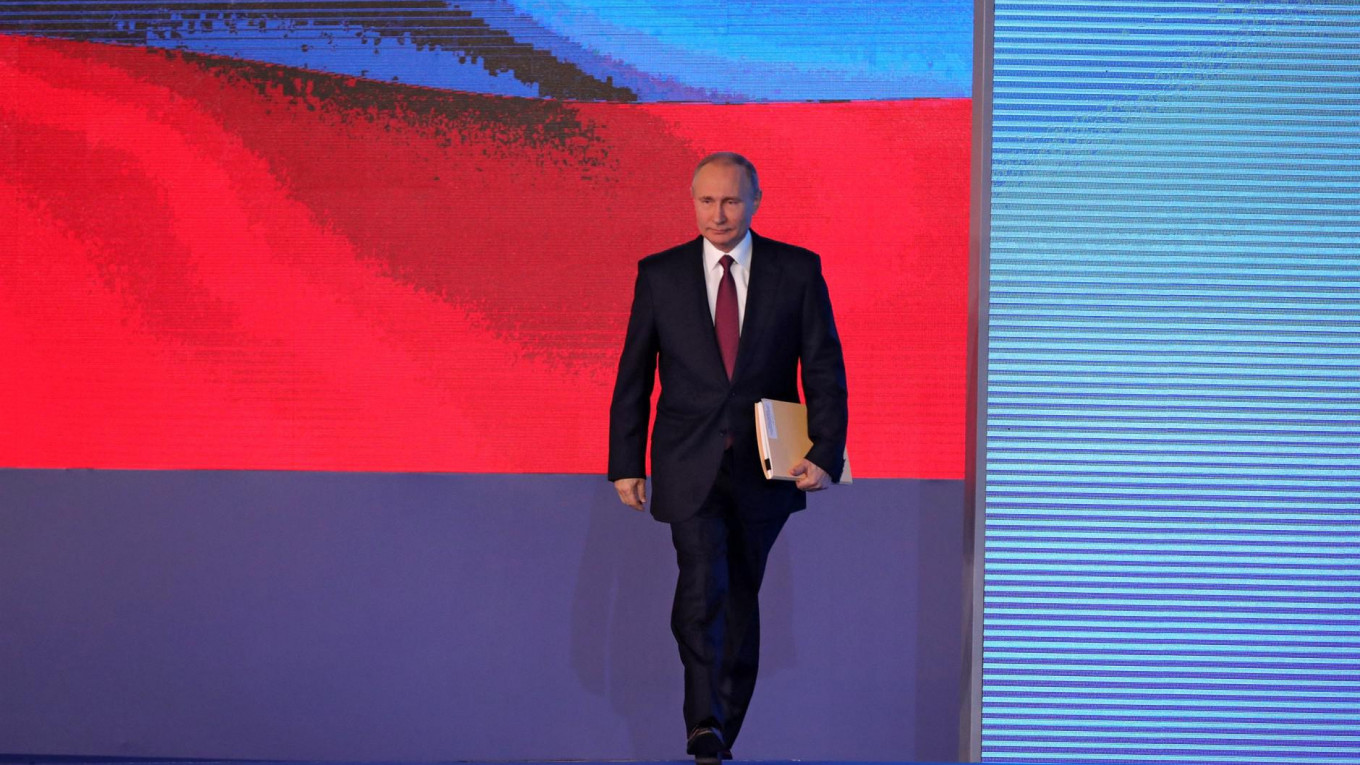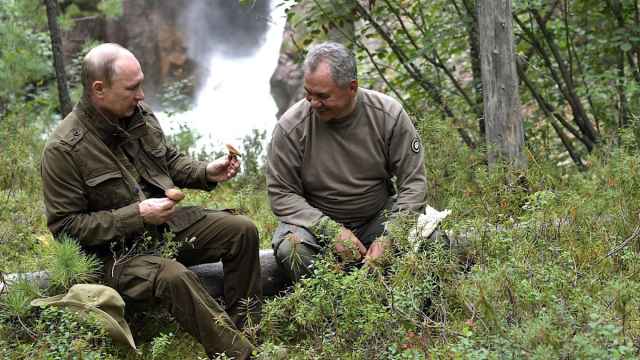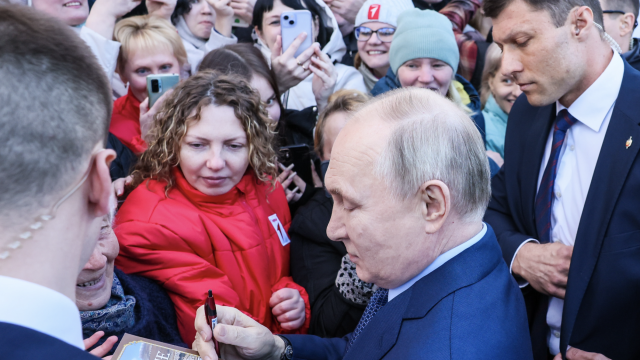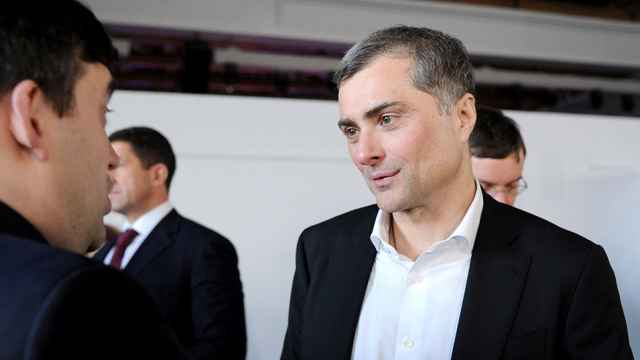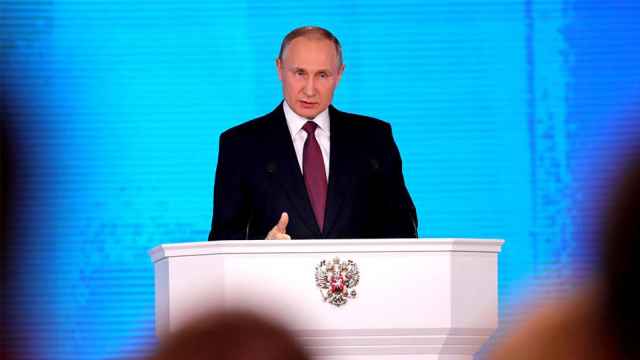(Bloomberg) — Russian President Vladimir Putin on Thursday made clear his priorities for his next six-year presidential term: He spent about as much time talking about Russia's new strategic weaponry as about all domestic policies put together.
Revanche and confrontation continue to drive Putin's agenda. In the meantime, he appears to believe that Russia's internal problems will largely fix themselves if he sets ambitious enough goals. That, regardless of the new weaponry, is a disaster in the making.
Putin's two-hour speech was designed to double as an annual state of the nation address and the centerpiece of Putin's campaign ahead of the March 18 presidential ballot. Despite a novel presentation with infographics flashing on giant screens, nothing about the first hour of the speech was particularly new or revealing.
The Russian leader, who has been in power for 18 years, has the luxury of comparing current well-being indicators with those Russia had in 2000 or 2001, and he used it extensively, boasting that Russians took out about 1 million mortgages in 2017 compared with 4,000 in 2001 and that 20 million Russians live below the poverty line now, compared to 42 million in 2000.
Not once did Putin mention the oil boom which made the improvements possible.
Putin recognized that some of the ambitious goals he set before the 2012 election — such as increasing labor productivity by 50 percent or drastically reducing poverty — weren't achieved but argued there would have been no progress had he not raised the bar.
He proceeded to set more targets, calling for Russia to double its health care spending in absolute terms to reach 4 percent of economic output and increase expenditure on stimulating the birth rate by 40 percent.
Road construction outlay, he said, should double, and regional airports should be modernized so that people wouldn't need to go through Moscow to get from one Russian region to another. Fiber-optic lines should provide fast internet throughout Russia by 2024. Government should be completely digitized.
These are enormous spending commitments.
Putin didn't explain how they would be funded and didn't promise any structural reforms that might uncover hidden economic reserves. He just mentioned "new tax conditions" that the government would have to create without stunting economic growth.
Sergei Aleksashenko, former deputy governor of the Russian central bank and now a strong Putin critic, summarized this part of the president's speech in two tweets:
— Election? What election?! Everything's clear, time to go to work.
— Everything that's good in this country happened thanks to me.
— I know there are problems, we'll solve them by throwing money at them. Where will the money come from? A niggling question, we won't discuss it.
— There are tough problems, I know. It's because bureaucrats aren't doing a good job. I'll show them!
But Putin visibly came alive for the second half of the address, which was entirely devoted to Russia's military resurgence and punctuated by computer-generated videos in the style of 1990s video games. These purported to demonstrate new weapons, which Putin assured his audience have all been successfully tested with some going into mass production.
These included several varieties of missiles, including a heavy ballistic one, Sarmat, and new types of cruise missiles all capable, according to Putin, of bypassing U.S. missile defenses.
The cruise missiles would have an unlimited range thanks to nuclear-powered engines, and the videos showed them dodging around the areas covered by U.S. anti-missile installations. The audience whooped as the missile trajectories converged somewhere in the Western hemisphere.
Putin also bragged about nuclear-powered underwater drones that could go faster and travel much further than any modern torpedos. No nation, he said, has similar weapons today, and they're all built with new, post-Soviet technology.
This part of the speech carried a three-part message to Western, primarily U.S., leaders:
— "We've never ceased to be a major nuclear power but no one would listen to us. Listen to us now!" (This line was greeted with a standing ovation)
— If you believed Russia was permanently left behind after the Soviet Union's breakup, you miscalculated: "Russia containment has failed."
— The U.S. anti-missile defense system and the expansion of NATO infrastructure to Russia's borders are "ineffective and a useless financial burden."
"This is not a bluff," Putin insisted — a claim that I hope will never be tested.
Some Putin allies were enthused about the threatening part of the speech. Margarita Simonyan, head of the RT propaganda channel, tweeted:
"If a U.S. president delivered such an address, 99 percent of the population and certainly the entire establishment would support it. Here, though, we get all this moaning and indignation — why the hell do we need these weapons, what an aggressive message. Why don't you just get the hell out!"
I'm inclined, however, to agree with another Muscovite who — like me — now lives overseas, art dealer Marat Guelman, who posted on Facebook:
"I'm truly beginning to fear for the country. It's not just a drug cartel with a nuclear button. It's not just a new burst of the arms race. It's some kind of madness."
The problem is not so much with the modern weapons — a country as big as Russia needs military strength — as with what the weapons are needed to defend.
Without a coherent vision of the future or an attractive model for others to imitate, without any soft power to speak of, without an economic model that can ensure sustainable growth or keep people out of poverty, the missile-rattling is a terrifying but hollow sound.
In the context of a mock election with a predetermined result, Russia's growing military might means better protection for an unaccountable, oppressive regime that doesn't have to keep any of the promises it makes. It's muscle without hope or substance.
Putin's fascination with the new toys is understandable.
But his mischievous suggestion that listeners suggest names for some of them ("Volodya," Simonyan immediately proposed, using the diminutive form of Putin's first name) has more symbolic meaning than the president put into it.
Sarmat, Kinzhal (Dagger) and any new names "patriots" come up with for the weapons leave a question: Are these the only internationally recognizable brands modern Russia is capable of producing? If not, why can't I remember any other ones?
Modernizing weaponry is fine as long as the rest of the country also undergoes modernization and sheds the features of a mafia state.
That's a tougher job and one Putin knows is required; he just isn't particularly excited about it — and so Russia is in for another six years of muscle-flexing and stagnation.
Leonid Bershidsky is a Bloomberg View columnist, the founding editor of the Russian business daily Vedomosti and the founder of the opinion website Slon.ru. The views and opinions expressed in opinion pieces do not necessarily reflect the position of The Moscow Times.
A Message from The Moscow Times:
Dear readers,
We are facing unprecedented challenges. Russia's Prosecutor General's Office has designated The Moscow Times as an "undesirable" organization, criminalizing our work and putting our staff at risk of prosecution. This follows our earlier unjust labeling as a "foreign agent."
These actions are direct attempts to silence independent journalism in Russia. The authorities claim our work "discredits the decisions of the Russian leadership." We see things differently: we strive to provide accurate, unbiased reporting on Russia.
We, the journalists of The Moscow Times, refuse to be silenced. But to continue our work, we need your help.
Your support, no matter how small, makes a world of difference. If you can, please support us monthly starting from just $2. It's quick to set up, and every contribution makes a significant impact.
By supporting The Moscow Times, you're defending open, independent journalism in the face of repression. Thank you for standing with us.
Remind me later.



